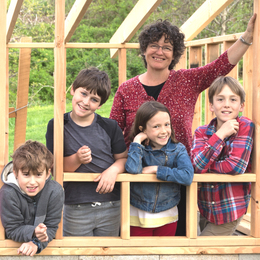
At Kimberton Waldorf School, merely opening a textbook to experience the wonders of the natural world isn’t enough. Rather, the more effectual method of learning, and one to which the school has long subscribed, is to fling open the school doors and introduce students to nature on a personal level.
The Phoenixville-based school sits on 430 bucolic acres dotted with woodlands, meadows, wetlands, and streams, and is bordered by picturesque French Creek. Founded in 1941 as Kimberton Farm School, it has long offered a farming program in concert with its nature-based curriculum. A new farming program will launch this summer as part of the Summer Nature and Farm Camp.
The year-round program is designed to engage children, with the joyful, health-giving work of caring for farmland creatures on a permanent farm. Seven Stars Farm, a certified biodynamic dairy farm, leases the land adjacent to the school, with the agreement that the school can use the property as a resource for the educational curriculum. The farm program will also expand the school’s current Applewood Farm on its main campus.
Kimberton Waldorf’s new farming program will benefit not only its students but also those from other Waldorf schools, as well as home-schooled students and afterschool groups. The goal is to impress upon young students the beauty of nature and the critical role it plays in human life, the responsibility of stewardship, and the value of meaningful work.
“It’s experiential learning,” says Carmen Maciarello, a class teacher at Kimberton Waldorf and director of the farming program. “Children bonding with animals and nature have classroom-performance benefits much like those found in students involved in music and arts. These are activities considered extracurricular. But they’re the things that make us human. Agriculture is a science, but it’s also an art. It expands us.
“It’s almost like we’re going back to our roots,” she continues. “We’ve always had a gardening program. But now we’re becoming much more conscious of what else is needed here.”
Maciarello, who has coordinated the summer camp at Kimberton Waldorf since arriving at the school in 2003, knows of what she speaks; she was raised on a dairy farm in Connecticut.
“The thing children connect fastest with are animals,” she adds. “We all know we can feel empathy for another living thing. But we also must be responsible for them. Caring for animals changes children’s lives. Many children can name endangered species belonging to the Amazon River Basin, but are afraid of crayfish in our local creeks. A child enters into a partnership with nature when enabled to go beyond abstract knowledge and enter into direct experience.”
In addition, she says the simple act of spending time outside can have a transformative effect.
“I’ve noticed children who spend more time outside tend to be healthier and better self-regulated,” she says. “They also tend to not get bored, have great imaginations, and are better connected to natural rhythms.”
Dean of Students Kevin Hughes concurs, adding that hands-on immersion in the natural world “makes the learning experience richer for the students.” To illustrate his point, he mentions the off-campus activities Kimberton Waldorf students have undertaken, such as a geology class backpacking in the Appalachians, and a senior marine biology class visiting coastal Maine.
In the near future, Hughes suggests Maciarello plans to add farm animals beyond chickens, goats, cows, and pigs, to enhance and expand the experience for students of Kimberton Waldorf, as well as from other schools.
“[Students] can come and visit for a day and work with the animals, or maybe spend a few nights at the school,” he says. “We also want to connect to home-schoolers for a day. Carmen plans to devise even more ways to expand this program to deliver a great experience for the students.”
Maciarello speaks enthusiastically about watching children derive satisfaction from feeding chicks or from simply sitting on a hillside watching goats, pigs, and sheep going about their day in a small farm adjacent to the school playground. For her, it is proof positive that the new farming program serves the school’s mission, offering a rich academic and artistic experience that fosters a sense of awe, as well as a sense of responsibility to the world around them.
By staying true to its farming roots, Kimberton Waldorf School is opening up its doors to the natural world—and opening young minds as a result.
To subscribe to Suburban Life magazine, click here.
To advertise in Suburban Life magazine, click here.


